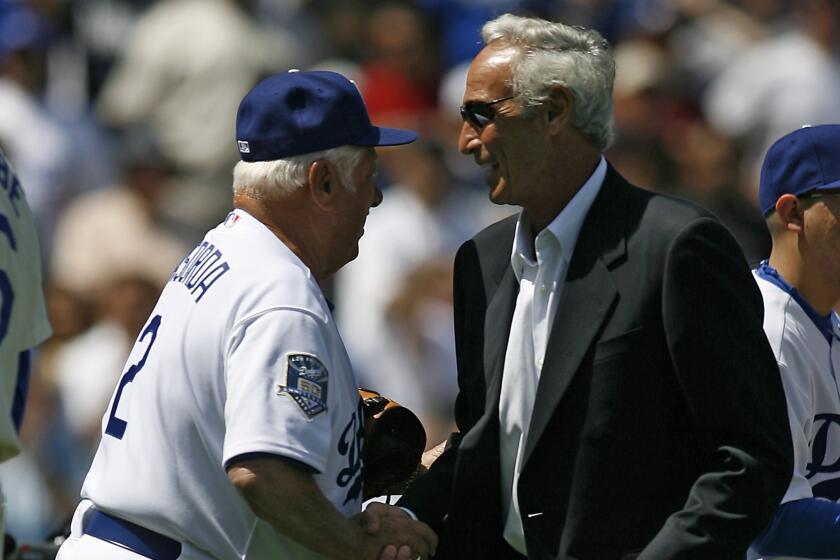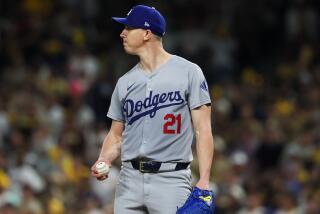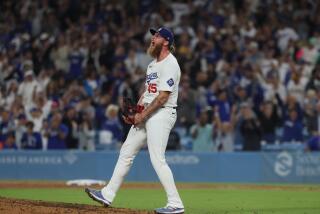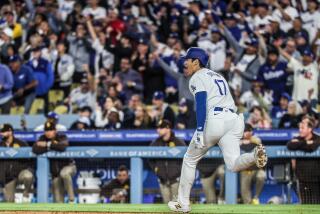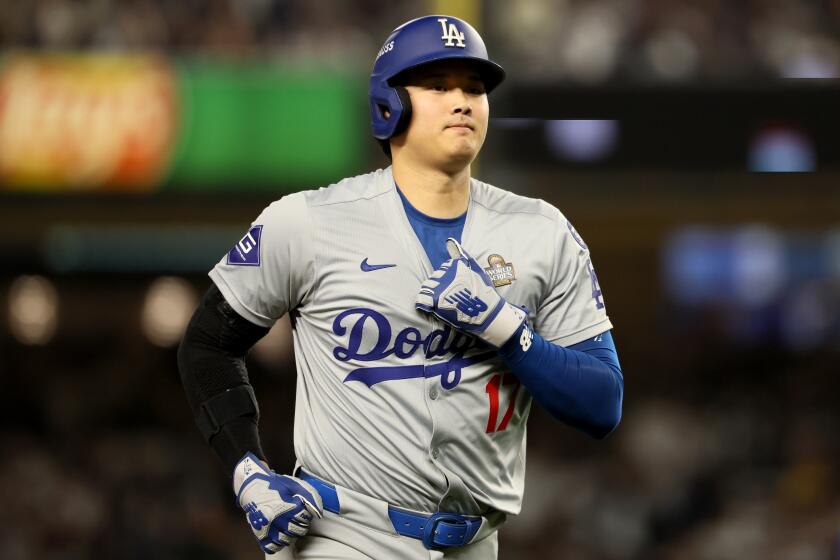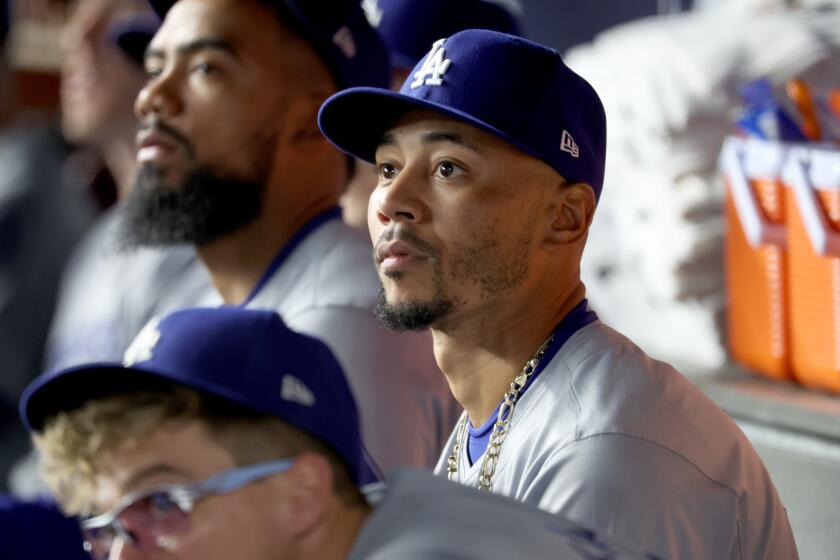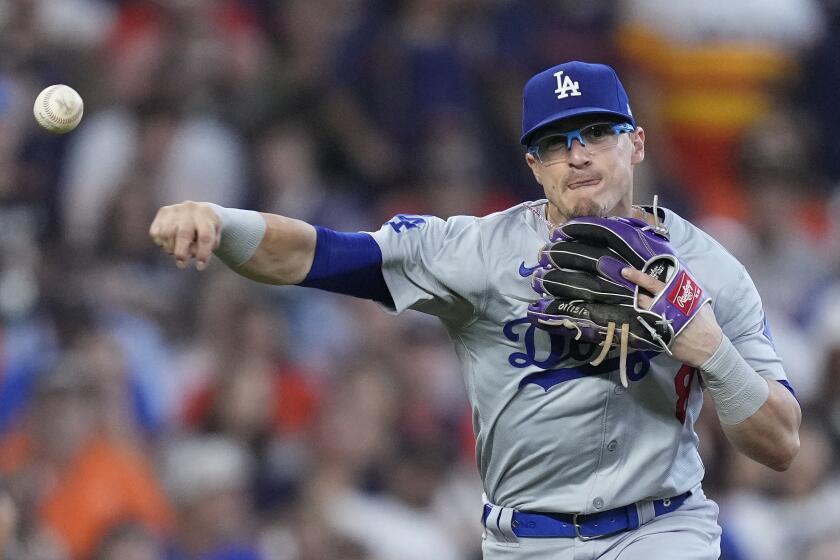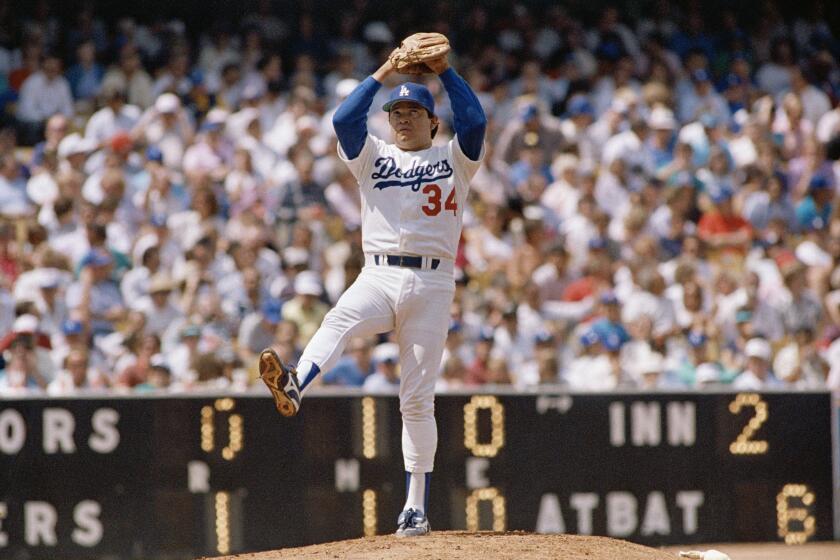Dodgers know firsthand the dominance of a healthy Corey Knebel, so they acquired him
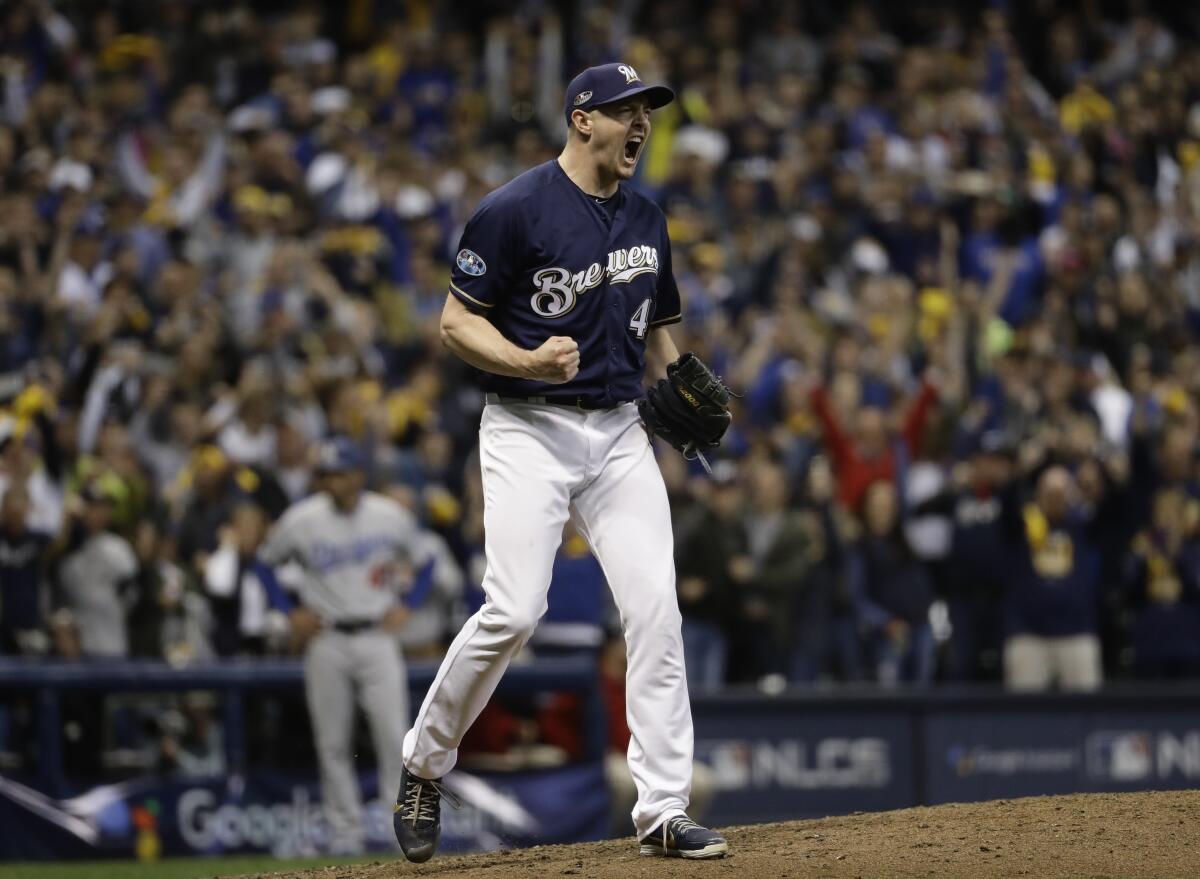
Dave Roberts doesn’t recall the details of the dugout chatter during the 2018 National League Championship Series so much as the gist of the exchanges.
The Dodgers outlasted Milwaukee in that seven-game series despite the dominance of Brewers reliever Josh Hader, a left-hander who was virtually untouchable in four games, giving up no runs and five hits while striking out 12 in 7-2/3 innings.
But stoking similar trepidation among Dodgers hitters was a less-heralded right-hander who pitched in six of the seven games, giving up one run and two hits, striking out 10 and walking two in seven innings: Corey Knebel, whom the Dodgers acquired in a Dec. 2 trade with Milwaukee.
“I just remember the comments hitters were making when he came into the game or when they were dropping their bat back in the rack, how nasty he was,” said Roberts, the Dodgers manager. “I don’t remember the specifics — just the mumbling, the frustration, the ‘Here we go again.’ He was tough.”
The Dodgers overcame a stout Brewers relief corps to advance to the World Series that October, but Knebel, the 6-foot-3, 224-pounder with a blazing fastball and knee-buckling curve, left a mark.
The Dodgers agreed to terms with a trio of highly regarded prospects among the 22 players they signed on the first day of the international signing period.
He was the 18th pitcher in major league history to appear in at least six games of a seven-game series, with only four of those bettering Knebel’s 1.29 ERA.
Knebel missed the entire 2019 season because of Tommy John surgery and struggled in his return from the elbow procedure in 2020, giving up nine earned runs and 15 hits, including four homers, striking out 15 and walking eight in 13-1/3 innings of 15 appearances.
But the Dodgers, who have a track record of rehabilitating underperforming relievers — see Brandon Morrow, 2017; Blake Treinen, 2020 — think Knebel can regain his 2017-18 form, so much so that they tendered a 2021 contract on the day they acquired him for a player to be named and signed him to an arbitration-avoiding $5.25-million deal Thursday.
“I think for us it was seeing what we saw in years past, what his fastball and breaking ball does to left and right, seeing it trend up toward the end of the season and betting on the person,” Roberts said. “That made it an easy decision, appreciating the fact he can pitch leverage innings and has done it with a lot of success.”
Knebel, 29, pitched mostly low-leverage innings with little success in 2020. The pandemic-interrupted season was a challenge for all but was especially disruptive for Knebel, whose return from April 2019 elbow surgery was thrown out of whack by the four-month shutdown.
Knebel thought he built up enough arm strength in workouts to open the regular season in late July. The radar gun said otherwise.
A fastball that averaged 97.4 mph in 2017, when the All-Star closer had a 1.78 ERA and 39 saves, 126 strikeouts and 40 walks in 76 innings, and 96.9 mph in 2018, when Knebel went 4-3 with a 3.58 ERA and 16 saves in 57 games, dropped to 92-94 mph.
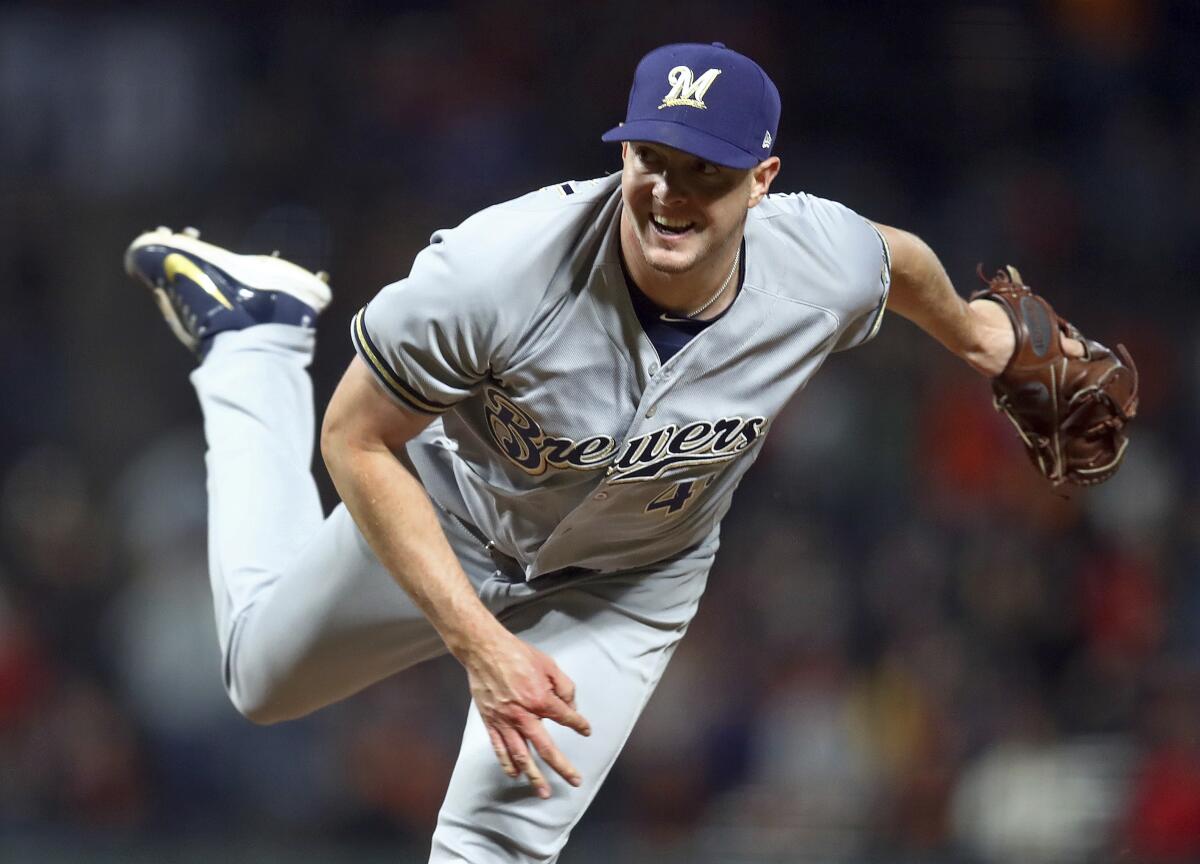
The harder Knebel tried to throw, the more his velocity slipped, the more his mechanics wavered and the more his command suffered.
“It was a domino effect for me last year,” Knebel said by phone from his home in Austin, Texas. “The velocity wasn’t there. The control wasn’t there. I was trying to throw it as hard as I could, and everything just went to crap.”
Knebel’s fastball dropped to a season-low average of 92.3 mph in an Aug. 19 game at Minnesota, after which he was placed on the injured list because of a left hamstring injury.
Rest, rehabilitation and regular work at the team’s alternate training site helped. Knebel’s fastball jumped to 95.1 mph in his Sept. 13 return against the Cubs and 95.9 mph in a Sept. 15 game against St. Louis.
“I don’t feel like I put myself in a situation to succeed last year,” Knebel said. “Basically, I was trying to learn how to throw again. … I was rehabbing, trying to get my arm back into shape, and by doing that I might have sacrificed some other things, like hip mobility, hamstring strength, my release, how I was landing. It wasn’t ideal.”
That didn’t deter the Dodgers, who were more encouraged by Knebel’s September velocity bump than they were alarmed by his results.
“I think the uptick in velo speaks to arm strength, which allows you to spin the baseball even better,” Roberts said. “So if the arm speed rebounds, then you can bet the curveball will be what it was as well.”
Knebel was in peak form in the 2018 NLCS, when he stifled the Dodgers with a fastball that can ride up or cut down in the zone, and a big-breaking 81-mph curve. He got ahead of hitters with first-pitch strikes in the first two games. When the Dodgers started attacking the first pitch, Knebel started batters with pitches just off the plate.
Dodgers legend Tommy Lasorda didn’t die. They just turned down the volume. The world of sports will now be quieter, and much less fun, Bill Dwyre writes.
“In Games 3 and 4 in L.A. my ball had a lot of cut to it,” Knebel said. “I remember facing [Yasiel] Puig and Kiké [Hernandez], there were a couple of balls that started on the outside corner and ended up in the other batter’s box, and I’ve never done that. A lot of things clicked for me in that series. Some of the most fun I had in my career was in that NLCS.”
Knebel expects the good times to roll again with the Dodgers, who have won eight consecutive NL West titles and played in three of the last four World Series, beating Tampa Bay last October for their first championship since 1988.
Knebel is on a regular throwing program this winter, having transitioned from “rehabbing” to “a normal offseason.” He hopes to eventually work his way to the back of a deep bullpen led by Kenley Jansen, Treinen, Brusdar Graterol, Joe Kelly, Victor Gonzalez and Adam Kolarek.
“I don’t expect to be thrown into a high-leverage role right at the beginning — I’ll have to earn my way,” Knebel said. “You’ve got four or five guys who could be closing. I think it’s a great problem to have, having too many elite relievers.”
More to Read
Are you a true-blue fan?
Get our Dodgers Dugout newsletter for insights, news and much more.
You may occasionally receive promotional content from the Los Angeles Times.

